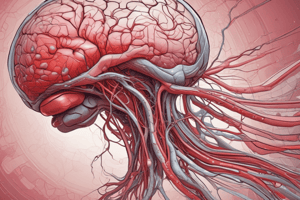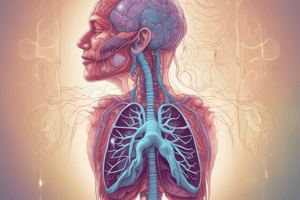Podcast
Questions and Answers
Neurophysiology primarily focuses on the study of the chemical properties of neuronal cells.
Neurophysiology primarily focuses on the study of the chemical properties of neuronal cells.
False (B)
Cardiovascular physiology includes the study of how nerves and hormones regulate circulation.
Cardiovascular physiology includes the study of how nerves and hormones regulate circulation.
True (A)
Human physiology covers only cellular responses and excludes systemic interactions.
Human physiology covers only cellular responses and excludes systemic interactions.
False (B)
Stress has no impact on the cardiovascular system, according to cardiovascular physiology.
Stress has no impact on the cardiovascular system, according to cardiovascular physiology.
Bioelectricity is a key focus area in neurophysiology, involving the examination of electrical properties of neuronal cells.
Bioelectricity is a key focus area in neurophysiology, involving the examination of electrical properties of neuronal cells.
Respiratory physiology focuses on investigating how carbon dioxide enters our bodies through lungs into the bloodstream via diffusion.
Respiratory physiology focuses on investigating how carbon dioxide enters our bodies through lungs into the bloodstream via diffusion.
Renal physiology involves maintaining fluid balance, electrolyte homeostasis, and filtering wastes out of the blood.
Renal physiology involves maintaining fluid balance, electrolyte homeostasis, and filtering wastes out of the blood.
Endocrine physiology primarily studies the effects of vitamins on cellular functions.
Endocrine physiology primarily studies the effects of vitamins on cellular functions.
Human physiology encompasses only the functions of separate body systems without any interactions between them.
Human physiology encompasses only the functions of separate body systems without any interactions between them.
Studying endocrine physiology is irrelevant for understanding metabolism, growth, development, tissue function, and reproduction.
Studying endocrine physiology is irrelevant for understanding metabolism, growth, development, tissue function, and reproduction.
Study Notes
Human Physiology
Human physiology refers to the study of functions and processes occurring within the body, encompassing everything from cellular responses to overall systemic interactions. While learning about all aspects of human physiology is not always feasible within essay constraints due to its vastness, we can explore some key areas, providing an overview of essential concepts that shape our understanding of the human body's functioning.
Neurophysiology
Neurophysiology delves into the field of biophysics and neuroscience, examining the electrical properties of neuronal cells and synaptic transmission, known as bioelectricity. It explores receptors that allow nerve impulses to occur, the chemical nature of neurotransmitters, and how nerves communicate with muscles, glands, and other parts of the body.
Cardiovascular Physiology
Cardiovascular physiology focuses on the circulatory system and its function, which includes the heart's structure and functions, blood flow through the heart, and how the cardiovascular system responds to changing needs throughout life. This encompasses understanding the influence of exercise, stress, and other factors that affect pressure within blood vessels, and how circulation is regulated by nerves and hormones.
Respiratory Physiology
Respiratory physiology investigates how oxygen enters our bodies through lungs into the bloodstream via diffusion, while carbon dioxide leaves the bloodstream to enter the lungs for expulsion from the body. It also examines the control mechanisms for respiration rate and depth, including neural influences like breathing patterns during sleep and wakefulness, as well as hormonal factors like acid-base balance.
Renal Physiology
Renal physiology concerns the kidneys' role in maintaining fluid balance and electrolyte homeostasis, filtering wastes out of the blood, and balancing minerals critical for various bodily processes. Understanding this branch enables insight into conditions such as renal disease.
Endocrine Physiology
Endocrine physiology deals with hormones and their effects on cellular functions, focusing on the glands producing these substances and their target cells. Regulation of metabolism, growth, development, tissue function, and reproduction are some aspects studied.
These areas represent just a few of many topics under human physiology. Each subject provides valuable knowledge about specific bodily systems and interactions between them, forming an intricate network responsible for sustaining life. For those interested in pursuing further study or research in these fields, resources such as literature reviews, conducting experiments, collecting data, writing proposals, structuring research plans, using academic styles, ethical considerations, and review processes can prove beneficial.
Studying That Suits You
Use AI to generate personalized quizzes and flashcards to suit your learning preferences.
Description
Explore key areas of human physiology such as neurophysiology, cardiovascular physiology, respiratory physiology, renal physiology, and endocrine physiology. Learn about the functions and processes occurring within the body that shape our understanding of the human body's functioning.




